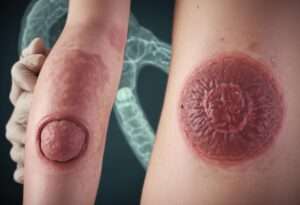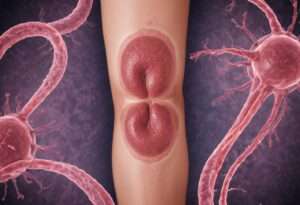Syphilis Testing: A Comprehensive Guide to Diagnosis and Screening
Syphilis, a sexually transmitted infection (STI) caused by the bacterium Treponema pallidum, has been on the rise in recent years. According to the Centers for Disease Control and Prevention (CDC), there were 129,813 reported new cases of syphilis in the United States in 2019, marking a 70% increase since 2015. With these alarming statistics, it’s crucial to understand the importance of syphilis testing, the various methods available, and when to get tested. This comprehensive guide will walk you through everything you need to know about syphilis testing, from the types of tests to interpreting results and follow-up care.
HPV Vaccine and Oral HPV: Understanding the Connection and Protection

Table of Contents
ToggleWhy Syphilis Testing is Important?
Syphilis testing plays a vital role in public health for several reasons:
1. Early Detection: Syphilis can be easily treated in its early stages, but if left untreated, it can lead to serious health complications.
2. Prevention of Transmission: Identifying and treating syphilis helps prevent its spread to sexual partners.
3. Pregnancy Screening: Testing pregnant women is crucial to prevent congenital syphilis, which can cause severe health problems for the baby.
Genital Warts: Duration, Treatment, and Prevention – A Comprehensive Guide
4. HIV Risk Reduction: Syphilis increases the risk of HIV transmission and acquisition, making testing an important part of HIV prevention efforts.
HPV in Guys: What Every Man Needs to Know

Types of Syphilis Tests
There are several methods used to diagnose syphilis, each with its own advantages and limitations. The two main categories of syphilis tests are:
1. Direct Detection Methods
These tests look for the presence of the T. pallidum bacterium itself.
• Darkfield Microscopy:
– Used to examine fluid from a syphilis sore (chancre)
– Can detect the bacteria in primary and secondary syphilis
– Requires specialized equipment and expertise
• Polymerase Chain Reaction (PCR):
– Detects the genetic material of T. pallidum
– Highly sensitive and specific
– Useful for detecting syphilis in difficult-to-diagnose cases, such as neurosyphilis
HPV in Men: A Comprehensive Guide to Understanding, Prevention and Treatment

2. Serologic Tests
These tests look for antibodies produced by the body in response to syphilis infection. There are two types of serologic tests:
a) Nontreponemal Tests:
• Venereal Disease Research Laboratory (VDRL) test
• Rapid Plasma Reagin (RPR) test
Characteristics of nontreponemal tests:
– Inexpensive and easy to perform
– Used for initial screening and monitoring treatment response
– Can result in false positives due to other conditions
– Become negative after successful treatment
HPV Dormancy: Understanding the Silent Phase of the Human Papillomavirus
b) Treponemal Tests:
• Fluorescent Treponemal Antibody Absorption (FTA-ABS) test
• Treponema pallidum Particle Agglutination (TPPA) test
• Enzyme Immunoassay (EIA) or Chemiluminescence Immunoassay (CIA)
Characteristics of treponemal tests:
– More specific than nontreponemal tests
– Used to confirm positive nontreponemal test results
– Remain positive for life, even after successful treatment
– Cannot distinguish between current and past infections
Natural Treatments for HPV: A Comprehensive Guide to Complementary Therapies
Traditional vs. Reverse Sequence Screening
There are two main approaches to syphilis screening:
1. Traditional Sequence:
– Start with a nontreponemal test (VDRL or RPR)
– If positive, confirm with a treponemal test
2. Reverse Sequence:
– Start with a treponemal test (EIA or CIA)
– If positive, follow up with a nontreponemal test for confirmation
The choice between these approaches often depends on the healthcare setting and available resources. The reverse sequence is becoming more common in high-volume testing environments due to its ability to be automated.
Genital Skin Tags vs. Warts: Understanding the Difference and Treatment Options
When to Get Tested for Syphilis?
The CDC recommends syphilis testing for:
• All pregnant women at their first prenatal visit
• Men who have sex with men (annually)
• Individuals with HIV (annually)
• Anyone with symptoms of syphilis
• Sexual partners of individuals diagnosed with syphilis
Additionally, you should consider getting tested if:
• You’ve had unprotected sex with a new partner
• You have multiple sexual partners
• You’re planning to become pregnant
• You’re required to get tested for employment or other reasons
Granuloma Inguinale: A Comprehensive Guide to the Rare STI
The Testing Process
1. Consultation: Discuss your sexual history and any symptoms with a healthcare provider.
2. Sample Collection:
– Blood draw for serologic tests
– Fluid sample from a sore for direct detection methods
3. Laboratory Analysis: The sample is sent to a lab for testing.
4. Results: Typically available within a few days to a week.
Mycoplasma Genitalium: The Silent STI You Need to Know About!
5. Follow-up: If positive, discuss treatment options and partner notification.
Interpreting Syphilis Test Results
Interpreting syphilis test results can be complex due to the various testing methods and the stages of the infection. Here’s a general guide:
• Positive nontreponemal test + Positive treponemal test = Current or past syphilis infection
• Positive nontreponemal test + Negative treponemal test = Likely false positive
• Negative nontreponemal test + Positive treponemal test = Possible very early infection, very late infection, or past treated infection
• Negative nontreponemal test + Negative treponemal test = No syphilis infection
It’s important to remember that interpreting results should always be done by a healthcare professional who can consider your individual circumstances and risk factors.
False Positives and Negatives
Like all medical tests, syphilis tests can sometimes produce false results:
False Positives: Nontreponemal tests can produce false positives due to:
– Pregnancy
– Autoimmune diseases
– Certain viral infections
– Intravenous drug use
False Negatives: Can occur in very early infections or in late-stage syphilis when antibody levels have decreased.

Syphilis Testing During Pregnancy
Testing for syphilis is a crucial part of prenatal care. The CDC recommends:
• All pregnant women should be tested at their first prenatal visit
• Women at high risk should be retested in the third trimester and at delivery
• Any woman who delivers a stillborn infant should be tested for syphilis
Rapid Syphilis Testing
Rapid point-of-care tests for syphilis are becoming increasingly available. These tests can provide results in 5-20 minutes and are particularly useful in settings where laboratory facilities are limited or follow-up might be challenging.
Post-Treatment Testing
After receiving treatment for syphilis, follow-up testing is essential to ensure the infection has been successfully treated. The CDC recommends:
• Repeat serologic testing at 6 and 12 months after treatment
• More frequent monitoring for high-risk individuals or those with HIV
Conclusion
Syphilis testing is a crucial tool in the fight against this resurgent STI. By understanding the types of tests available, when to get tested, and how to interpret results, you can take control of your sexual health and contribute to public health efforts to control syphilis.
Remember, early detection and treatment are key to preventing the serious complications of untreated syphilis. If you’re sexually active, consider regular syphilis testing as part of your overall health routine. When in doubt, don’t hesitate to consult with a healthcare provider about your individual testing needs.
Reference to External Sources:
1. Centers for Disease Control and Prevention (CDC) – Syphilis Testing:
2. World Health Organization (WHO) – Syphilis Screening and Treatment:
3. American Sexual Health Association – Syphilis Testing:
4. National Health Service (NHS) UK – Syphilis Test:
5. Mayo Clinic – Syphilis Diagnosis and Treatment:


